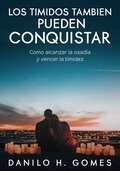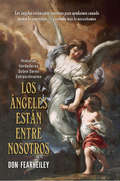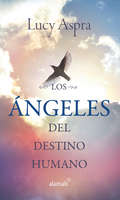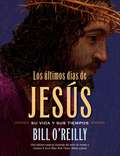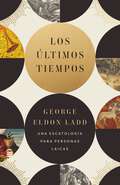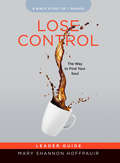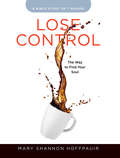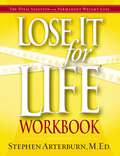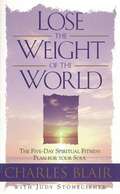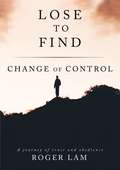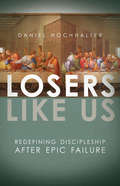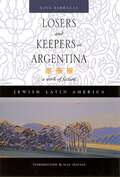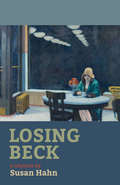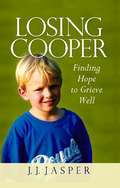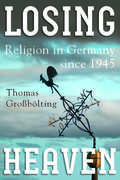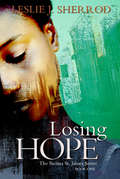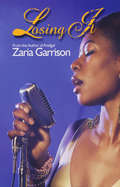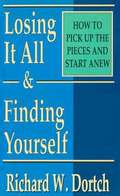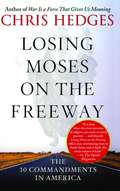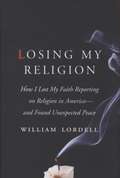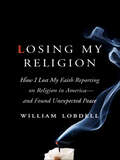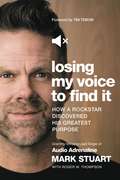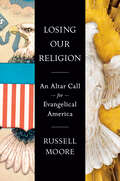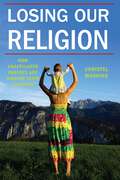- Table View
- List View
Los timidos tambien pueden conquistar: Como alcanzar la osadía y vencer la timidez
by Danilo H. GomesTodos nosotros conocemos al menos una persona tímida, ¿verdad? Por cierto ... tal vez eres una persona tímida. En fin, el hecho es que la mayoría de las personas no sabe lo difícil que es vivir encadenado por los grilletes de la vergüenza excesiva. La única salida: trabajar los pensamientos uno por uno. Conozca este trabajo y quede encantado con el numero de argumentos existentes que pueden ayudarlo mucho en la lucha contra la timidez. (Este libro está destinado principalmente para hombres).
Los Ángeles del destino humano
by Lucy AspraEn este libro, Lucy Aspra explica la labor que realizan los Ángeles. De Lucy Aspra, experta en temas de ángeles y seres espirituales. El trabajo de los Ángeles es mucho más extenso que lo que describen algunos textos antiguos. No están limitados sólo a ciertos aspectos místicos, ni confinados únicamente a llevar a cabo las ceremonias religiosas, pues todo lo que el ojo humano alcanza a percibir, y que es noble, bueno y altruista, procede de la labor que realizan. Los Ángeles están en todo aquello que nos encamina a elevar nuestro estado de conciencia, y los seres humanos, sin notarlo, los estudian diariamente, porque son estos celestiales seres los que conducen las energías que producen crecimiento, son ellos los que traen las tendencias positivas y los que inspiran los descubrimientos necesarios para que la humanidad pueda dar un paso más hacia el futuro. El trabajo de los Ángeles es científico. Aquí conocerá cómo trabajan los Ángeles a la hora del nacimiento, cómo realizan su trabajo los que laboran en la composición de las formas que se manifiestan en todos los reinos de la naturaleza, en qué momento entra el Espíritu en el bebé que se forma en el vientre materno, cómo preparan los Ángeles las situaciones en la vida de cada persona antes de su nacimiento. Explica por qué la familia en la que nacemos, las oportunidades de las que disponemos, los talentos que traemos, las tendencias que podemos encauzar, controlar o mejorar. Experimentos mediante partículas de agua que manifiestan nuestra conciencia han arrojado pruebas del poder del sonido, de la meditación, de la oración, etcétera. Cómo influye en nuestra vida cada palabra que emitimos y cada sonido que escuchamos.
Los Últimos días de Jesús (The Last Days of Jesus)
by Bill O'Reilly William Low Carlos Uxo Cobalt Illustrations Studio, IncHace dos mil años, Jesús caminó por Galilea; allá donde viajaba, más y más personas se convertían en sus seguidores. Sus contemporáneos son figuras históricas conocidas: Julio César, César Augusto, Herodes, Poncio Pilatos. Aquella era una época de una opresión omnipresente, en la que hombres, mujeres y niños se hallaban bajo el brutal poder del Imperio Romano. Jesús vivió en este mundo; en un contexto política e históricamente volátil en el que también murió, cambiando el mundo para siempre. Adaptado del gran éxito de ventas de Bill O'Reilly, el thriller histórico Matar a Jesús, y con vistosas y detalladas ilustraciones, Los últimos días de Jesús es una explicación, fascinante y basada en hechos, de la vida y los tiempos de Jesús, ahora disponible en español.
Los últimos tiempos: Una escatología para personas laicas
by George Eldon LaddEn Los últimos tiempos, George Eldon Ladd ofrece una discusión seria sobre la escatología escrita para el laico, basando su doctrina de las últimas cosas en la convicción de que "nuestra última palabra... se encuentra en la reinterpretación del Nuevo Testamento a través de la profecía del Antiguo Testamento".Las profecías bíblicas sobre el fin de los tiempos han sido tema de una gran cantidad de libros. Sin embargo, muchos de ellos son relatos popularizados que contienen poca erudición bíblica razonada. Aun así, los estudios serios disponibles son a menudo muy difíciles de entender para el lector promedio. En Los últimos tiempos, George Eldon Ladd se ha empeñado en rectificar esta situación con una discusión seria sobre la escatología escrita para el lector cotidiano.Se han ofrecido dos interpretaciones de la relación entre las profecías del Antiguo y Nuevo Testamento. Una perspectiva ve programas separados para Israel y la Iglesia cristiana, mientras que la otra reconoce la revelación progresiva y la unidad de los Testamentos.El profesor Ladd mantiene la última postura, basando su doctrina de las últimas cosas en la convicción de que «nuestra última palabra... se encuentra en la reinterpretación del Nuevo Testamento a través de la profecía del Antiguo Testamento». Solo cuando las profecías se ven a la luz de la revelación de Dios por medio de Cristo, podemos comprender claramente a lo que se refieren en relación al fin de los tiempos.The Last ThingsIn The Last Things, George Eldon Ladd offers a serious discussion of eschatology written for the layperson, basing his doctrine of the last things on the conviction that &“our final word . . . is to be found in the New Testament reinterpretation of Old Testament prophecy.&”Scriptural prophecies about the end times have been the subject of a great number of books. Many of them, however, are popularized accounts containing little thoughtful biblical scholarship. Yet the serious studies available are often too difficult for the average reader to understand. In The Last Things, George Eldon Ladd has endeavored to rectify this situation with a serious discussion of eschatology written for the everyday reader. Two radically different interpretations of the relationship between the prophecies of the Old and New Testaments have been offered. One view sees separate programs for Israel and the Christian church, while the other recognizes progressive revelation and a unity of the Testaments. Professor Ladd holds the latter position, basing his doctrine of the last things on the conviction that &“our final word . . . is to be found in the New Testament reinterpretation of Old Testament prophecy.&” Only as the prophecies are seen in the light of God's revelation through Christ can we clearly comprehend what they mean in relation to the end times.
Lose Control - Women's Bible Study Leader Guide: The Way to Find Your Soul (Lose Control)
by Mary Shannon HoffpauirLearn to live in total dependence on God through a study of 1 Samuel.Have you ever thought you had life under control—until you didn’t? Perhaps thinking “God is in control” but living as if you are. It's like walking around with a hot cup of coffee, afraid that with one wrong move it will spill and be a burning hot mess. Then you realize what little control you have and how dependent on God you truly are.In Lose Control, Mary Shannon Hoffpauir takes you on a six-week journey through the Book of First Samuel, which is an epic story about a fight for control. Despite God’s warnings through the prophet Samuel, the nation of Israel was determined to take control by having their own king. As you dig into the saga of King Saul and David, who would become the next anointed king of Israel, you will discover that no plan or purpose of God can be thwarted by human beings. Even the worst of circumstances can be used by God to accomplish His purposes in your life.In her no-nonsense, authentic teaching style that endears her to women of all ages, Mary Shannon encourages you to lose control so that you can find your soul through a trusting relationship with your faithful God.Components for this six-week Bible study, each available separately, include a Participant Workbook, a Leader Guide, and a DVD with six 25-minute segments (with closed captioning).
Lose Control - Women's Bible Study Participant Workbook: The Way to Find Your Soul (Lose Control)
by Mary Shannon HoffpauirLearn to live in total dependence on God through a study of 1 Samuel.Have you ever thought you had life under control—until you didn’t? Perhaps thinking “God is in control” but living as if you are. It's like walking around with a hot cup of coffee, afraid that with one wrong move it will spill and be a burning hot mess. Then you realize what little control you have and how dependent on God you truly are.In Lose Control, Mary Shannon Hoffpauir takes you on a six-week journey through the Book of First Samuel, which is an epic story about a fight for control. Despite God’s warnings through the prophet Samuel, the nation of Israel was determined to take control by having their own king. As you dig into the saga of King Saul and David, who would become the next anointed king of Israel, you will discover that no plan or purpose of God can be thwarted by human beings. Even the worst of circumstances can be used by God to accomplish His purposes in your life.In her no-nonsense, authentic teaching style that endears her to women of all ages, Mary Shannon encourages you to lose control so that you can find your soul through a trusting relationship with your faithful God.Components for this six-week Bible study, each available separately, include a Participant Workbook, a Leader Guide, and a DVD with six 25-minute segments (with closed captioning).
Lose It for Life Workbook
by Stephen ArterburnEverywhere you turn, you hear hype on the latest weight-loss craze--low carb vs. low fat, cardio vs. weight training, diet pills vs. surgery. Most of those programs will help you drop a few pounds, but for how long? And for what purpose? Just to look better?Yet you are more than a physical being. You want a holistic approach to health that doesn't stop at "physical" fitness. Lose It For Life is your answer--a uniquely balanced program that deals with the physical, emotional, and especially the spiritual elements that lead to permanent weight loss.Lose It For Life was developed by best-selling author and radio personality, Stephen Arterburn, who lost 60 pounds 20 years ago and has kept it off. In his revolutionary book, he and Dr. Linda Mintle, who is known for her clinical work with those dealing with weight issues, gave you the game plan for accomplishing what you desire most: permanent results. This workbook picks up where the book left off, offering a wide variety of exercises and activities to lead you to the next level in understanding why you do what you do, how you can shed bad habits for good, and how, with the help of God and others, you can develop a whole new approach to life, to eating, and to living healthy and free!Lose It For Life is truly the total solution for permanent weight loss. And the Lose It For Life Workbook is the perfect companion to help you maintain your results permanently! It contains even more of the information and motivation you need to live healthy, look good, and to finally . . . Lose It For Life!
Lose Your Cool, Revised and Expanded Edition: Discovering a Passion that Changes You and the World
by Zach HunterYou don’t love a mocha the same way that you love Jesus. As a teen today, you probably have plenty of interests and plenty to plug into. In the midst of the constant stimulus—activities, media, text messages, and social networking—activist and fellow teenager Zach Hunter asks: What consumes the bulk of your time? How do you zero in on what really matters? Zach wrote this book to share powerful inspiration from the lives of others and to promote his steadfast belief that his generation is capable of great things—actions that may require shedding conventional notions of what is cool and important—and of choices that can heat up, ignite, and stoke the flames of a deeper passion, the kind of passion that changes the world. Are you ready to lose your cool?
Lose the Weight of the World
by Charles BlairMedical science tells us stress is a killer. Our daily routines tell us the same thing. For the burned-out and weary comes a book that highlights the modern person's spiritual malnourishment. Aimed at developing the spiritually and emotionally fit man and woman, this timely book focuses on purifying our thoughts, firming up Bible knowledge, and shedding a harmful self-image. An uncompromising look at the things that nag all of us, Lose the Weight of the World promises to trim the fat of our souls.
Lose to Find: Change of Control
by Roger LamRoger Lam thought he was done with writing after pouring 46 years&’ worth of his life lessons into his first book, Lost and Found: Money vs. Riches. That was almost certainly the case until multimedia messages from God led him to liquidate his entire equity portfolio in early February 2018, followed by an unbelievably supernatural confirmation the following morning. Immediately, deep in Roger Lam&’s heart he knew this was a story that had to be told for the glory of God, but little did he know that this dramatic conclusion to his pledge for church premises pales in comparison to what God had planned ahead for him in the rest of 2018.Lose to Find: Change of Control reads like a Christ follower&’s diary of wrestling with surrender. Despite constantly feeling like the most unlikely spokesperson and champion for stewardship and generosity, it became clear to Roger Lam that God was not satisfied to leave the other areas of his life besides money remaining in his control--his vocation, safety and purpose. Continuing in the same authenticity and conversational tone for which readers around the world have shown appreciation in his first book, Roger Lam humorously shares his continued God-ordained spiritual transformation, going beyond the area of money which (he thought) he had already mastered. This new leg of his Spirit-filled journey entails unimaginable, interlinked supernatural adventures starting in Hong Kong, followed by divine appointments in Beijing, Tel Aviv, Jerusalem, South India, Shanghai and Washington D.C. all within a calendar year.
Losers Like Us: Redefining Discipleship after Epic Failure
by Daniel HochhalterIn 2008, after seven years of preparation, Daniel Hochhalter permanently failed his PhD, leaving him with no refunds, no transferable credits, no recourse to appeal or try again, and no hope of gaining the qualifications needed for his desired career. Then he lost his job. Devastated and in crisis, with no Plan B and no clue how to redeem his future, he looked to the twelve disciples and discovered that--despite their gaping faults and sins--God still loved them and used them to change the world. With fresh warmth and wisdom, ample hope and humor, Losers Like Us skillfully intertwines Dan's own story with theirs to show how our worst mistakes and greatest failures bring us to a place of teachableness, egolessness, brokenness, and empathy--the very qualifications required to receive God's love and grace, and to manifest his kingdom on earth.
Losers and Keepers in Argentina: A Work of Fiction (Jewish Latin America Series)
by Nina BarraganRifke Schulman, a Russian Jew, came to Argentina in 1889 at the age of eighteen and helped set up the small agricultural colony called Moises Ville. Rifke's journal and the accompanying short stories introduce Bela Pelatnik, a victim of the white slave trade; Henoch Rosenvitch, the love of Rifke's life; Leah Uberman on her way to attend Moises Ville's centennial celebration; and many others. The book spans the last hundred years and examines the experience of Jewish immigrants in both North and South America, some of whom were nourished by their roots, others who severed their ties to an old way of life. In looking at the choices they all made, the ways they found love or shut themselves off from it, Nina Barragan offers a moving and multidimensional portrait of early twentieth-century Argentina and its contemporary descendants.
Losing Beck: A Triptych
by Susan HahnA young poet’s relationship with a predatory professor is explored through a diary, a play, and a novella dealing with themes of grief, trauma, and desire.Jennie Silver has been seduced, abused, and abandoned by Benedict Eck, a Midwestern literature professor known for being influenced by Hungarian émigré novelist Avigdor Element, and a notorious womanizer known for preying on vulnerable graduate students. In the process, Jennie keeps a diary and writes a play and a novella in her attempt to control her desperate, high-pitched emotions focused on a man she is uncontrollably drawn to and at the same time finds repugnant—a man who is one of the keepers and part of the legacy of Element’s bad behavior.Spanning a hundred years of history from when Nijinsky danced “The Afternoon of the Faun” in Paris in 1912, through World Wars I and II, to very close to the present, Losing Beck is not only a portrait of one woman’s relationship with one man, but an exploration of obsession, grief, desire, and the effects of historical trauma.“This triptych of narratives contains a plenitude of characters driven by overpowering emotions and dark motives . . . I was especially fascinated by the meticulous scrutiny of family relations, especially mother-daughter attachments, often dramatized against a backdrop of twentieth-century Jewish history.” —Laurence Goldstein, author of The American Poet at the Movies: A Critical History
Losing Cooper: Finding Hope To Grieve Well
by J. J. JasperA true story of hope in the midst of great personal tragedy. Losing Cooper: Finding Hope to Grieve Well, is the moving story of the Jasper family after the tragic death of their five-year-old son Cooper. The book chronicles their journey through darkness, but offers real hope to anyone experiencing trouble, trials or tragedy. It shows how a strong Christian family deals with shock, loss and grief from a Biblical perspective.
Losing Heaven: Religion in Germany since 1945
by Thomas GroßböltingAs the birthplace of the Reformation, Germany has been the site of some of the most significant moments in the history of European Christianity. Today, however, its religious landscape is one that would scarcely be recognizable to earlier generations. This groundbreaking survey of German postwar religious life depicts a profoundly changed society: congregations shrink, private piety is on the wane, and public life has almost entirely shed its Christian character, yet there remains a booming market for syncretistic and individualistic forms of “popular religion.” Losing Heaven insightfully recounts these dramatic shifts and explains their consequences for German religious communities and the polity as a whole.
Losing Hope: Book One of the Sienna St. James Series (Sienna St. James Ser.)
by Leslie J. SherrodFrom the acclaimed author of Like Sheep Gone Astray and Secret Placecomes a riveting new series with twists and turns to the end.Social worker Sienna St. James is a woman with a complicated past and a confusing Tuesday morning. In one single day, every advance Sienna has made in getting over her long lost globe-trotting husband unravels in unexplainable fashion. From a mysterious package that hails from another continent to a new teen client who claims to have a missing sister, Sienna finds herself in the middle of a city-wide scandal, all while sorting out the painful details of her personal life. At the center are two suspicious foster parents, a mega-church ministry leader, and Sienna's own fragile emotions over a man who changed the direction of her life. It's a race against time as Sienna seeks closure from a love she never understood and answers about whether a little girl named Hope ever existed. And if she did, where is she now? In this first installment of the suspenseful Sienna St. James Series, finding hope in the midst of questions and chaos becomes essential when life takes an unexpected turn.
Losing It
by Zaria GarrisonGrammy award-winning gospel singer and Christian actress Sharmaine Cleveland is having a bad year. She has been arrested and charged with the attempted murder of her husband, Leon. This follows on the heels of another scandal involving sex tapes allegedly starring Sharmaine that have been distributed to news stations across the country. Her latest CD release is a flop, while her newest movie release has been placed on hold indefinitely. Believing she wants him dead, her husband Leon abandons her, and her mother-in-law forcibly takes her children. Sharmaine's life is sinking fast. Will she go under, or will God be able to pick her up and put the pieces back together?
Losing It All & Finding Yourself
by Richard W. DortchNo matter what you do, you cannot stop God from loving you! Richard Dortch knows what it means to lose it all. Fired from his job, forced out of his home, dismissed from his denomination, and facing an eight-year prison sentence for his involvement at PTL, he hit rock bottom. He lost his integrity, his reputation, his freedom, and his sense of self-respect. Standing among the ruins of his life, Richard Dortch dusted himself off and began the journey back. Only someone who has been there and back can take you up on the mountains and into the valleys and point out the way. With remarkable insight, Richard Dortch shares the secrets of his heart and gives you a glimpse into his soul. You'll come away marveling at the grace of a loving Heavenly Father and strengthened in your own spirit to face whatever life may bring. And, hopefully, you, too, will look deep within and find something you may have lost along the way - yourself.
Losing Moses on the Freeway: The 10 Commandments in America
by Chris HedgesThe 10 Commandments -- the laws given to Moses by God -- are beyond the scope of human law. They are rules meant to hold us together but, when dishonored, they lead to discord and violence. <P><P> In this fierce, articulate narrative, Hedges, who graduated from seminary at Harvard Divinity School, looks through the lens of each commandment to examine the moral ruin of American society. With urgency and passion, he challenges readers to take a hard look at the disconnect between their supposed values and the shallow, self-absorbed lives many people actually lead. <P> Taking examples from his personal life and twenty years of reporting, Hedges explores one commandment at a time, each through a particular social group. With each story, he reveals the universal nature of personal suffering, discovery, and redemption -- and explores the laws that we have tried to follow, often unsuccessfully, for the past 6,000 years.
Losing My Religion: How I Lost My Faith Reporting on Religion In America--and Found Unexpected Peace
by William LobdellLobdell's journey of faith -- and doubt -- is a book about life's deepest questions that speaks to everyone: the author understands the longings and satisfactions of the faithful, as well as the unrelenting power of doubt. How he faced that power, and wrestled with it, is must reading for people of faith and nonbelievers alike.
Losing My Religion: How I Lost My Faith Reporting on Religion in America—and Found Unexpected Peace
by William LobdellWilliam Lobdell's journey of faith—and doubt—may be the most compelling spiritual memoir of our time. Lobdell became a born-again Christian in his late 20s when personal problems—including a failed marriage—drove him to his knees in prayer. As a newly minted evangelical, Lobdell—a veteran journalist—noticed that religion wasn't covered well in the mainstream media, and he prayed for the Lord to put him on the religion beat at a major newspaper. In 1998, his prayers were answered when the Los Angeles Times asked him to write about faith. Yet what happened over the next eight years was a roller-coaster of inspiration, confusion, doubt, and soul-searching as his reporting and experiences slowly chipped away at his faith. While reporting on hundreds of stories, he witnessed a disturbing gap between the tenets of various religions and the behaviors of the faithful and their leaders. He investigated religious institutions that acted less ethically than corrupt Wall St. firms. He found few differences between the morals of Christians and atheists. As this evidence piled up, he started to fear that God didn't exist. He explored every doubt, every question—until, finally, his faith collapsed. After the paper agreed to reassign him, he wrote a personal essay in the summer of 2007 that became an international sensation for its honest exploration of doubt.Losing My Religion is a book about life's deepest questions that speaks to everyone: Lobdell understands the longings and satisfactions of the faithful, as well as the unrelenting power of doubt. How he faced that power, and wrestled with it, is must reading for people of faith and nonbelievers alike.
Losing My Voice to Find It: How a Rockstar Discovered His Greatest Purpose
by Mark StuartThe incredible story of a lead singer's rise to fame and his crushing fall when he lost his singing voice, his career, and his marriage--and then found a new calling more in tune with God than he ever thought possible. Mark Stuart was the front man of popular Christian rock band, Audio Adrenaline, at a time when the Christian music scene exploded. Advancing from garage band to global success, the group sold out stadiums all over the world, won Grammy Awards, and even celebrated an album going certified Gold. But after almost twenty years, Mark's voice began to give out. When doctors diagnosed him with a debilitating disease, the career with the band he'd founded and dedicated his life to building was gone. Then to his shock, his wife ended their marriage, and Mark believed he'd lost everything.Unsure of his future, Mark traveled to Haiti to help with the band's ministry, the Hands and Feet Project. When the devastating 2010 earthquake hit, media learned he was present and sought him out for interviews. Ironically, Mark became the scratchy voice for the struggling Haitians, drawing the world's attention to their dire circumstances. In the process, Mark found a greater purpose than he'd ever known before. In this gripping, compelling new book, Mark Stuart overlays his story with passages from the gospel of John, urging his readers to listen for God's voice and to embrace his big love that calls us into a big life.
Losing Our Religion: An Altar Call for Evangelical America
by Russell MooreFormer Southern Baptist pastor and Christianity Today editor-in-chief Russell Moore calls for repentance and renewal in American evangelicalismAmerican evangelical Christianity has lost its way. While the witness of the church before a watching world is diminished beyond recognition, congregations are torn apart over Donald Trump, Christian nationalism, racial injustice, sexual predation, disgraced leaders, and covered-up scandals. Left behind are millions of believers who counted on the church to be a place of belonging and hope. As greater and greater numbers of younger Americans bleed out from the church, even the most rooted evangelicals are wondering, &“Can American Christianity survive?&”In Losing Our Religion, Russell Moore calls his fellow evangelical Christians to conversion over culture wars, to truth over tribalism, to the gospel over politics, to integrity over influence, and to renewal over nostalgia. With both prophetic honesty and pastoral love, Moore offers a word of counsel for how a new generation of disillusioned and exhausted believers can find a path forward after the crisis and confusion of the last several years. Believing the gospel is too important to leave it to hucksters and grifters, he shows how a Christian can avoid both cynicism and complicity in order to imagine a different, hopeful vision for the church.The altar call of the old evangelical revivals was both a call to repentance and the offer of a new start. In the same way, this book invites unmoored and discouraged Christians to step out into an uncertain future, first by letting go of the kind of cultural, politicized, status quo Christianity that led us to this moment of reckoning. Only when we see how lost we are, we can find our way again. Only when we bury what&’s dead can we experience life again. Only when we lose our religion can we be amazed by grace again.
Losing Our Religion: How Unaffiliated Parents Are Raising Their Children (Secular Studies #1)
by Christel J. ManningExamines how "Religious Nones" negotiate tensions with those who think they ought to provide their children with a religious upbringingThe fastest growing religion in America is—none! One fifth of Americans now list their religion as “none,” up from only 7 percent two decades ago. Among adults under 30, those poised to be the parents of the next generation, fully one third are religiously unaffiliated. Yet these “Nones,” especially parents, still face prejudice in a culture where religion is widely seen as good for your kids. What do Nones believe, and how do they negotiate tensions with those convinced that they ought to provide their children with a religious upbringing?Drawing on survey data and in-depth personal interviews with religiously unaffiliated parents across the country, Christel Manning provides important demographic data on American “Nones” and offers critical nuance to our understanding of the term. She shows that context is crucial in understanding how those without religious ties define themselves and raise their families. Indeed, she demonstrates that Nones hold a wide variety of worldviews, ranging from deeply religious to highly secular, and transmit them in diverse ways. What ties them all together is a commitment to spiritual choice—a belief in the moral equivalence of religions and secular worldviews and in the individual’s right to choose—and it is that choice they seek to pass on to their children.The volume weaves in stories from the author’s interviews throughout, showing how non-religious parents grapple with pressure from their community and how they think about religious issues. Engagingly written and thoroughly researched, Losing Our Religion will appeal to scholars, parents, and anyone interested in understanding the changing American religious landscape.
